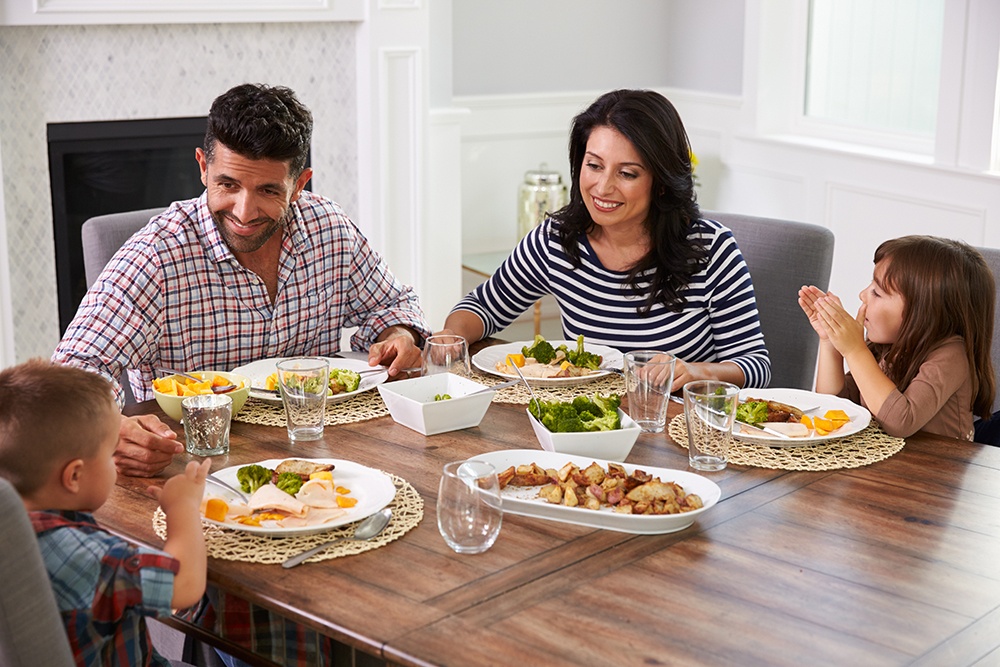Recently, I was speaking at a parish men’s group on creating genuine encounters within the family. At the end of the talk, I opened up for some Q & A and got a great question. One of the men asked, “How important is it really to have dinner together as a family?”
Before I get into my answer, here is a little context. This was a parish in Northern Virginia. I’ve lived and practiced all over the country and I’ve never seen an area more demanding on family time than Northern Virginia. Everybody is overworked, overscheduled and overtired. Traffic is a mess (the stretch of I-95 that I take to get home was recently named the most congested in the country. Great job, everyone!), cost of living is high, and the pressures and expectations are higher still.
Sadly, where pressure on family is concerned, a lot of the country is starting to look more and more like Northern Virginia.
So when this gentleman was asking how important is it for us to eat together as a family, what he was likely saying was, “My kids have some activity every single night of the week and with my commute, I don’t get home until 7 p.m. if I’m lucky. Family time is very much more aspirational than a reality. Is that a problem for my family?”
Does Eating Together Really Matter?
Yes, eating dinner together matters and is extremely important. Even if it’s the only 30 minutes of the day that the family is able to be together in one place.
Dinnertime is a key opportunity for us to connect with all the other members of the family. We can share about our day or discuss opinions. Most importantly, we can listen to what the other people around the table have to say. This shows them how much we respect them and value their perspective.
Dinnertime can also be a time for prayer and family catechesis. Use the occasion to be together, connect with one another and pray together.
Better yet, consider cooking together before eating together. This is a tough one for families with young children, but it can be so important for families with older children. Put the homework aside for a night and unite as a family in the kitchen. Prepping, cooking, eating and sharing in the work of cleaning together can be both practical and purposeful.
Reduce Distractions
What does not show that we value the perspective of others is allowing ourselves to be intentionally distracted. To that end, keep phones and tablets away from the table. They’re too distracting. Keep the TV off. It can be hard enough as it is to connect as a family in the best of circumstances, so why invite things that make it more challenging by adding extra obstacles and disturbances?
Given how busy we all are between work and the demands of dozens of different activities, there seems to be less time available for families to be together. So why wouldn’t we go for the low-hanging fruit and make dinner time a priority for our families so we can reconnect every day?
God can communicate to us through our relationships with our family. If we do not turn off, put away and focus, we might be not only missing out on a relationship with one another, but with God, too. Use the Holy Family as a guide and Mary as an example.
Face-to-Face: How to Actively Engage and Connect as a Family
What comes next? How do we continue to create time and space for family connections? First, and most importantly, family connections can’t be an afterthought, or the thing we squeeze in around the dozen other activities and obligations to which we find ourselves committed.
Make spending time with your family a priority. It needs to be the first thing we find time for, not the last.
What we desire is to spend time together in ways where we can genuinely engage. So watching TV or playing video games as a family, might not be ideal because those are passive activities. It’s more about the show or the game than it is the people around us.
I had an 8-year-old tell me once that he liked it better when his family played board games (he liked playing “Cranium”) than when they played video games. This was unusual for most 8-year-olds, so I asked him why. He said it was because with board games, they were actually able to see each other.
I was blown away by that response. He was picking up on the fact that when the board game is in the center of a group of people (in this case, his family), you’re actually looking at the other players gathered around the game. With a video game, you’re all staring at the same screen.
This young man felt more connected to his family when they were all around the table playing “Cranium” than he did when they all stared at the TV playing “Mario Party.” He recognized that when his family was all in the same room playing a video game, it was still fun, but he didn’t feel it was really good quality time. What he desired was a genuine encounter where he felt actively connected to his family.
Here are seven suggestions to actively be connected with one another:
- Go on a scavenger hunt.
- Make a family newsletter to which everyone can contribute.
- Have a family cake-baking contest.
- Research your family tree.
- Start a family fantasy football league.
- Learn a new craft like knitting, mosaic or origami.
- Hike or bike local trails.
Regardless of what you decide, remember that it’s the time and connection together that is far more important than the activity. Take the opportunity to be active and intentional about drawing together, rather than allowing the pull of countless other demands become the family priority.
We want Catholic families to be engaged and connected, not just a collection of people sharing a roof and a mailing address.



